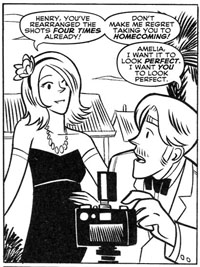 Written by Andrew Rostan
Written by Andrew Rostan
Art by Dave Valeza and Kate Kasenow
120 pages, black and white
Published by Archaia
It’s hard, sometimes, to not feel a tiny bit cynical about a graphic novel, in a time where so many are secretly (or not-so-secretly) doubling as movie pitches. In the case of An Elegy for Amelia Johnson, writer Andrew Rostan confuses the issue a bit, giving that feel perhaps because so much of the book is about making a movie. It is apt to feel that way, though, because just like many a movie, An Elegy for Amelia Johnson is the sort of book that is all right on your first exposure, but just falls apart the more you look at it.
The basic plot is fairly simple; Amelia Johnson, on her deathbed, asks two friends to deliver a series of messages in the forms of videos to some important people in her life before she dies. As Henry (an Oscar-winning filmmaker) and Jillian (a writer) begin their trip, they turn the experience into a documentary shoot about Amelia’s life, but of course nothing goes quite as planned. A lot of An Elegy for Amelia Johnson feels awfully familiar; the pair of friends brought together to work together that start sensing something more, the unspooling of a larger story by a series of interviews and flashbacks.
Reading the book, it was hard to shake the feeling that Amelia Johnson herself is a slightly manipulative person (to put it mildly), and as the book progresses down a predictable path, it was the idea that Amelia herself isn’t necessarily the best person out there that kept me going. It’s around there that I began to realize that An Elegy for Amelia Johnson probably wouldn’t work for me as anything but a print book, because an actor could just as easily soften the role. In a print medium, a lot of those acting cues are gone, letting the reader have a bit more leeway on how they’d like the story to be read.
 Of course, while Rostan probably left some of the ambiguity about Amelia in the book deliberately, it feels like he was leaning towards a happier reading of the book and the titular character. The one character to speak negatively of Amelia (her brother) is the exception to the otherwise glowing praise, and there’s some insinuation that even he forgives her in the end. And of course, as signposted from the beginning, it’s a romantic journey for the two leads who end up together in the end, clearly one final "gift" from Amelia. It’s still a little hard to buy their getting together in the end, despite the intention of the book from day one, though. They’ve got a remarkable lack of chemistry together (even on the printed page) and they’re both such clichés at being so uber-talented that they’re a little unbelievable as characters in general. The more you look at them, the less you ultimately like them. Then again, it’s hard in general to feel sympathy for characters like an Oscar-winning director who gets in trouble from his studio by going off and recording an unremarkable documentary without talking with them about it first. It’s a bad combination of unbelievably talented and unbelievably naïve.
Of course, while Rostan probably left some of the ambiguity about Amelia in the book deliberately, it feels like he was leaning towards a happier reading of the book and the titular character. The one character to speak negatively of Amelia (her brother) is the exception to the otherwise glowing praise, and there’s some insinuation that even he forgives her in the end. And of course, as signposted from the beginning, it’s a romantic journey for the two leads who end up together in the end, clearly one final "gift" from Amelia. It’s still a little hard to buy their getting together in the end, despite the intention of the book from day one, though. They’ve got a remarkable lack of chemistry together (even on the printed page) and they’re both such clichés at being so uber-talented that they’re a little unbelievable as characters in general. The more you look at them, the less you ultimately like them. Then again, it’s hard in general to feel sympathy for characters like an Oscar-winning director who gets in trouble from his studio by going off and recording an unremarkable documentary without talking with them about it first. It’s a bad combination of unbelievably talented and unbelievably naïve.
The saving grace of An Elegy for Amelia Johnson is, easily, the art. Dave Valeza and Kate Kasenow’s exact collaboration isn’t explained (although it sounds like Valeza provided breakdowns and/or pencils, while Kasenow finished/inked the art), but whatever it is, I like it. It reminds me of artists like J. Bone, with loose, open faces and figures. From Henry’s little black dots for eyes, to the rims on William Johnson’s glasses, every character is carefully drawn in a way that provides something to catch the reader’s eye and make them remember the character. Generally speaking, it’s a book of attractive, clean-cut characters, and they all look good together.
I wanted to like An Elegy for Amelia Johnson much more than I did. The first read through, it was all right if immensely predictable, but ultimately the slightly saccharine tone coupled with some uninteresting main characters (and a manipulative person that is supposed to be great) makes it a book you probably shouldn’t revisit. Like many a similar type of movie, it’s fine until you stop and think about it.
Purchase Links: Amazon.com | Powell’s Books
